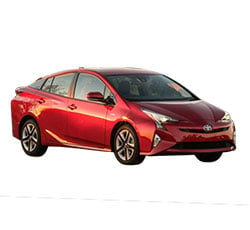2018 Toyota Prius Trim Levels with Comparisons & Configurations.

As the original mass-production hybrid car, the Toyota Prius holds a special position among the high fuel economy cars. It faces a lot more competition today than it did when it originally arrived on the scene in 2000, including from a number of its own varieties such as the Prius C, the Prius V, and the Prius Prime.
Still, the original Prius remains a strong seller and a powerful presence dominating the hybrid market. It is really the car to beat for all other hybrid or alternative energy vehicles. Aside from its impressive fuel economy, it also offers a large comfortable cabin for passengers and a sizable storage area for their stuff. It also includes a fair number of advanced standard and optional features.
The feature set on the 2018 Toyota Prius is distributed among its idiosyncratically-named trim levels, ranging from the base Prius One to the fully-loaded Prius Four Touring. The seven available trim levels cover a fairly wide range of both equipment and price, making for plenty of choice for drivers.
Compare the 2018 Prius One vs Two Eco Trims. What is the difference?
The base Prius is known as the Prius One. It is quite nicely equipped, but it is still mostly a fleet and price leader vehicle that is unlikely to appear frequently on dealer lots. Still, it comes equipped with a fairly comprehensive set of standard features. It comes with the full selection of power features, as well as keyless entry and push-button start. Headlights and taillights are LEDs, and there is a 6.1-inch touchscreen controlling the infotainment and serving as a display for the standard rearview camera.
It also includes the full Toyota Safety Sense package of active safety equipment, including forward collision warning with automatic braking, adaptive cruise control, active lane control, and automatic high beam control. The only major feature outing the Prius One as a basic model are the 15-inch steel wheels that it rides on. It is a great deal for the price-conscious consumer, assuming they find one available.
The Prius Two Eco is actually slightly more expensive than the regular Prius Two, but it has more in common with the Prius One than with its own mass-market equivalent. The Prius Two Eco shares the same equipment set as the Prius One, with a few additions and exceptions. It adds seat-back pockets, illuminated entry, and headlights with an auto on/off function. The main difference that the Prius Two Eco offers is a lighter battery. It also loses some interior trim pieces and optional accessories, such as a cargo cover.
The net result is a more lightweight vehicle which translates to between 3 and 4 miles per gallon more in fuel economy. Even given that the lowest mileage on the Prius measures in at 50 miles per gallon, the additional increase is a noticeable one. Otherwise, the Prius Two Eco offers no further options or features, just like the Prius One.
While the Prius One is slightly more expensive than a conventional compact car, its high fuel economy and an impressive set of standard features easily justifies its price point. Even for a non-hybrid vehicle, it can offer a fairly good deal for buyers who care about comfort and technology.
Compare the 2018 Toyota Prius Two Eco vs Two Trims. What is the difference?
The Prius Two shares the same base technology as the Prius One, but cleaned up a little in order to serve as the entry-level model for most buyers. Unlike the Two Eco, it does not have the lighter battery, and so gets the same mileage as the Prius One.
The Two does come with more features though. It includes an intermittent rear windshield wiper, as well as a temporary spare tire that replaces the tire repair kit from the Prius One and Two Eco. It also includes the Safety Plus Package, which adds further safety features to the model. Those include blind spot monitors with rear cross traffic alert, an intelligent clearance sonar, and intelligent parking assist.
As the mass-market model, the Prius Two is very nicely equipped, especially given that it costs only about $1,000 more than the Prius One, making it less expensive than the Eco model. The added safety equipment does contribute to the Two feeling safer than the previous two models, as does the included spare tire. As mentioned above when discussing the One, it is also going to be the least expensive model available at most dealerships due to the relatively small One production numbers.Compare the Prius Two vs Three Trims. What is the difference?
The Prius Three is the mid-range model in the lineup where Toyota starts adding some nice convenience and technology features into the lineup. The Three uses the same auto-on/off headlights as the Prius Two Eco that didn’t make it to the Prius Two. It also includes a synthetic leather steering wheel cover, wireless smartphone charging, and an upgraded infotainment system.
The larger 7-inch screen supports satellite and HD radio, and comes with the Toyota Entune mobile app support. While not as robust as Android Auto and Apple CarPlay, it does allow drivers to use key apps such as navigation through the touchscreen.
The Prius Three also includes the Safety Plus Package standard, and can be loaded up with the Advanced Technology Package in addition to that. The Advanced Technology Package includes a color heads-up display with navigation directions and general vehicle information, as well as a power moonroof.
The Prius Three is a good entry in the middle of the Prius lineup. The improved infotainment system is a very popular feature that was missed on the earlier models, even though it does not offer as much connectivity options as an Android Auto or Apple CarPlay setup that is available with many competitors.
Compare the Prius Three vs Three Touring Trims. What is the difference?
The biggest upgrade that the Prius Three Touring offers over the regular Prius Three is the SofTex synthetic leather upholstery that is covering the seating surfaces as well as accenting the interior. For environmental reasons, no Prius model actually includes real leather, but the synthetic material on the Three Touring and the two high-end Prius trims are the next best thing.
In addition to those features, the Three Touring also includes 17-inch alloy wheels, LED clearance lights, fog lights with LED accents and a unique bumper treatment. All of those features are Touring model exclusive, and are not part of the Prius Four feature set. The optional Advanced Technology package from the Prius Three is not available on the Prius Three Touring, and is instead replaced by an Appearance Package that further improves on the car’s styling.
For less than $1,500 over the Prius Three, the Touring primarily adds styling features beyond the upgraded upholstery. While the synthetic leather is easier to clean and feels nicer than the cloth interior, it is still not the real thing, which does dampen the value of the model somewhat. Most buyers will want to try this model out to see if they enjoy the feel of the seating. Those who see it as an improvement over the cloth will find value in the upgrade, while those that don’t are better off with the regular Prius Three.Compare the 2018 Toyota Prius Three vs Four Trims. What is the difference?
Aside from the synthetic leather upholstery, the Prius Four does not include any of the features added by the Prius Three Touring, though it does include all of the standard Prius Three features. It also includes heated front seats and a power adjustment function for the driver’s seat.
The main reason why the Prius Four is a popular choice is the upgraded infotainment system it includes. At a hefty 11.6 inches, the touchscreen is rendered in high definition, includes a built-in navigation system, and is one of the best infotainment systems available today, if one is willing to forgive the lack of Android Auto or Apple CarPlay. An auto-dimming rearview mirror with HomeLink rounds out the standard features, while the Advanced Technology Package from the Prius Three models is also optional on the Prius Four.
It can also be upgraded to the Premium Convenience Package, which adds a JBL sound system and Safety Connect®, which notifies the authorities in case the car is in an accident, stolen, or requires emergency assistance.
The giant infotainment screen on the Prius Four feels somewhat futuristic, which seems like enough to make it the big feature of this high-end Prius model. Aside from that, the major features offered by the Prius Four over the two Prius Three models are the power seat and the premium sound system. For drivers who want access to those features and like the giant infotainment screen, going with the Four could be a good choice, though it does not offer much increase in functionality for the price compared to the other models.Compare the 2018 Prius Four vs Four Touring Trims. What is the difference?
The highest Prius trim level, the Prius Four Touring combines the features of the Prius Four with the added visual components of the Prius Three Touring. Those include the 17-inch wheels, extra LED lighting, and a Touring bumper treatment. It also comes with rain-sensing windshield wipers, which are the sole unique feature that the Four Touring adds. The Premium Convenience Package from the Prius Four is also included on all Four Touring models, giving it the full set of available Prius equipment as standard features.
The only feature available on the Prius Four Touring that is not available anywhere else are the rain-sensing windshield wipers. Aside from those, there is no real reason to choose the Four Touring beyond the added styling cues. At more than $2,000 over the base price of the Four, it is not a good investment for anyone who is not particularly interested in the way it looks compared to the regular Prius.Final Thoughts
The 2018 Toyota Prius comes with more trim levels than the average car in the segment, but each one proves to be a fairly incremental upgrade over the previous option. Depending on the desired features, each one could make for a good selection for different kinds of drivers, with a few exceptions.
The Prius One is unlikely to be the best choice for buyers, due to its low availability and the amount of features added by the barely more expensive Prius Two. At the other end of the scale, the Prius Four Touring offers little to justify its price increase over the regular Prius Four.
Aside from those two outliers, the 2018 Prius offers good value among all of its trim levels, with the Two providing good entry-level value, the Eco maximizing economy, the two Three models offering a good balance between price and features, and the Four introducing some high-end technology.
Even without moving on to the other varieties of the Prius nameplate, there is truly a Prius for everyone.

